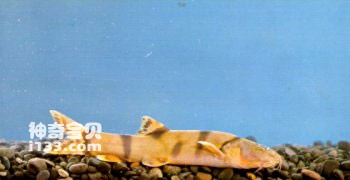Leptobotia elongata belongs to the order Cypriniformes, the family Leptobotia, the subfamily Leptobotia, and the genus Leptobotia. Commonly known as: flower fish, spotted loach, flower loach, flower loach, red sand loach, and fire army. English name: Elongate loach.
Endangerment level: Vulnerable.
The body is long, the sides are flat, and the tail peduncle is high and thick. The side of the head is flat and pointed, and the head is longer than the body height. The snout is round, blunt and short, the mouth is large, sub-inferior, and the mouth cleft is horseshoe-shaped. The upper and lower lips are thick; the lip folds are separated from the jaws, and there is no button-like protrusion under the jaw. There are 3 pairs of mustaches, 2 pairs of kisses and 1 pair of quarrels. The eyes are very small, with a smooth hard thorn on the lower edge of the eye, and the end exceeds the back edge of the eye. The nostrils are close to the edge of the eye, the anterior nostril is tubular, the posterior nostril is larger, and there is a separate skin fold between the front and rear nostrils. The gill opening is small, and the gill membrane is connected above the front edge of the pectoral fin base and the isthmus side. The dorsal and anal fins are short and have no hard spines; the dorsal fin is located in the rear half of the body; the pectoral and pelvic fins are short, with a long skinfold at the base of the pectoral fin; the caudal fin is deeply forked. The scales are extremely small. Complete lateral lines. The back of the head has irregular dark brown patterns, the sides of the head and gill cover are yellowish brown, and the body is light grayish brown. Smaller individuals have 6-7 very wide dark brown horizontal stripes, while larger individuals have irregular markings. The abdomen is light yellowish brown. There are two rows of dark brown stripes at the base of the dorsal fin and near the edge, and the dorsal fin has a yellowish-brown color. The pectoral and pelvic fins are orange-yellow with brown spots. The anal fin has 2 rows of brown markings; the caudal fin is light yellowish brown with 3-4 brown stripes.

Lives in the middle and upper reaches of rivers, in riverbanks and streams with rapid currents. They often live in groups between gravels or rock gaps on the bottom of the water and are bottom fish. When rivers rise, they have the habit of traveling upstream. It is a carnivorous fish that feeds mainly on small bottom fish. The reproductive period is from March to May, and the eggs hatch on stones.
Longbo loach is distributed in the middle and upper reaches of the Yangtze River, from Hubei and Hunan to western Sichuan.
The long thin loach is the largest species among the thin loaches. Generally, the individual weight is 1.0-1.5 kilograms, and the largest individual can reach about 3 kilograms. It once accounted for a certain proportion in the catch composition of the middle and upper reaches of the Yangtze River and is one of the important economic fish in the production area. In recent years, due to the overall decline in river fish resources, the number of small miscellaneous fish used as food has decreased significantly, which has a certain impact on the growth of long thin loach; secondly, water and soil erosion in the upper reaches of rivers and changes in hydrological conditions have also affected habitat conditions and production. The spawning grounds were damaged; combined with overfishing and other factors, the number of long-bodied loaches dropped significantly.
animal tags:
We created this article in conjunction with AI technology, then made sure it was fact-checked and edited by a Animals Top editor.